The Mental Health Education Development of China University Students
- 格式:pdf
- 大小:152.30 KB
- 文档页数:2

英文回答:In line with the current need forprehensive development and improvement of the mental health level of secondary school students, a medium—level education programme (mental health and career) has been designed to guide students intheir proper understanding of themselves, planning for their future, developing the right professional vision and objectives,and building self—confidence and adaptability。
The plan aims to strengthen mental health education through the teaching of thought and politics, to build the right vision of life, values,mental resilience, resilience and prevention of psychological problems。
The aim is to lead students to the right political positions and views and to promote their full development, in line with the party ' s and the State ' s guidelines, policies and policies, with positive political significance and social values。
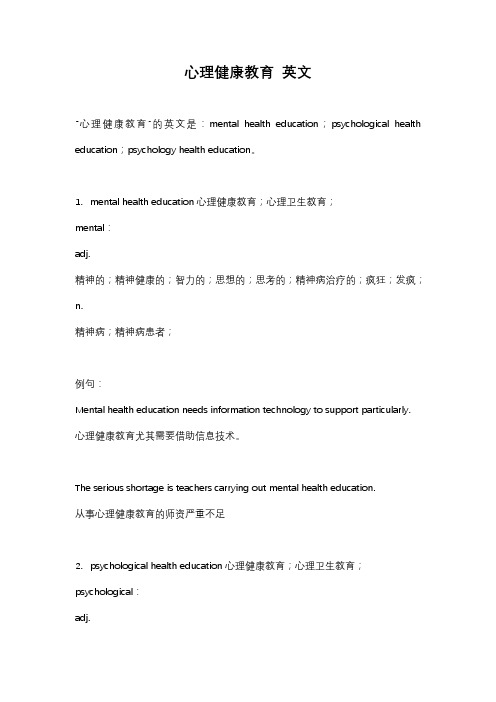
心理健康教育 英文“心理健康教育”的英文是:mental health education;psychological health education;psychology health education。
1.mental health education心理健康教育;心理卫生教育;mental:adj.精神的;精神健康的;智力的;思想的;思考的;精神病治疗的;疯狂;发疯;n.精神病;精神病患者;例句:Mental health education needs information technology to support particularly.心理健康教育尤其需要借助信息技术。
The serious shortage is teachers carrying out mental health education.从事心理健康教育的师资严重不足2.psychological health education心理健康教育;心理卫生教育;psychological:adj.心理的;心理学的;心灵的;精神上的;关于心理学的例句:Psychological health education is a higher professional and comprehensive educ ation activities.心理健康教育是一项专业性要求较高的综合性的教育活动。
The basis for creativity education is psychological health education.高校创造性教育的基础是心理健康教育。
3.psychology health education心理健康教育psychology:n.心理;心理学;心理特征;心理影响例句:The psychology health education should be put together with work of the diseas e prevention.开展心理健康教育要与卫生防病工作结合起来。

英文讲解心理健康教育《英文讲解心理健康教育》In today's fast-paced and stressful world, mental health has become an increasingly important issue. As a result, the importance of mental health education has never been greater. In this article, we will discuss the importance of mental health education, the benefits of having a good mental health, and some strategies for promoting mental well-being.First and foremost, mental health education is important because it helps individuals to understand and recognize the symptoms of mental health disorders. This knowledge can help to reduce the stigma associated with mental illness and encourage individuals to seek help when needed. Additionally, mental health education can help to promote a greater understanding and empathy towards those who are struggling with mental health issues.Having good mental health is also incredibly beneficial for individuals. It can lead to improved physical health, better relationships, increased productivity, and a greater sense of overall well-being. Furthermore, good mental health can help to protect individuals against the development of mental health disorders, as well as improve their ability to cope with stress and adversity.In order to promote mental well-being, there are a number of strategies that individuals can employ. These include practicing self-care, such as getting enough sleep, eating well, and engaging in regular physical activity. Additionally, individuals can benefit from developing healthy coping strategies, such as seeking socialsupport, practicing relaxation techniques, and developing problem-solving skills.In conclusion, mental health education is an important aspect of overall health and well-being. By increasing awareness and understanding of mental health issues, individuals and communities can work towards creating a more supportive and accepting environment for those who are struggling with mental health disorders. Additionally, by promoting good mental health, individuals can experience a greater sense of overall well-being and resilience in the face of life's challenges.。

心理健康教育教材英文版《Understanding the Mind: A Mental Health Education Textbook》Mental health education is an important topic that is often overlooked in traditional education settings. However, with the increasing awareness of mental health issues, there is a growing demand for educational resources that focus on promoting mental well-being and understanding mental disorders.The textbook, "Understanding the Mind: A Mental Health Education Textbook," is a comprehensive guide that covers various aspects of mental health. It provides a thorough overview of the importance of mental health, the factors that contribute to mental well-being, and the warning signs of common mental disorders. Additionally, the textbook offers practical strategies for managing stress, building resilience, and seeking help when needed.One of the key strengths of this textbook is its holistic approach to mental health education. It addresses the biological, psychological, and social factors that influence mental well-being, and provides a balanced perspective on the complex nature of mental health. Furthermore, it emphasizes the importance of destigmatizing mental disorders and promoting a culture of empathy and supportfor individuals with mental health challenges.The textbook is also designed to be accessible and engaging for students. It includes interactive activities, case studies, and real-life examples to help students apply their knowledge to real-world situations. Additionally, it incorporates the latest research and evidence-based practices in the field of mental health, ensuring thatstudents receive accurate and up-to-date information.Overall, "Understanding the Mind: A Mental Health Education Textbook" is a valuable resource for educators, students, and anyone interested in promoting mental well-being. By providing a solid foundation of knowledge and practical skills, this textbook is instrumental in fostering a mentally healthy society.。
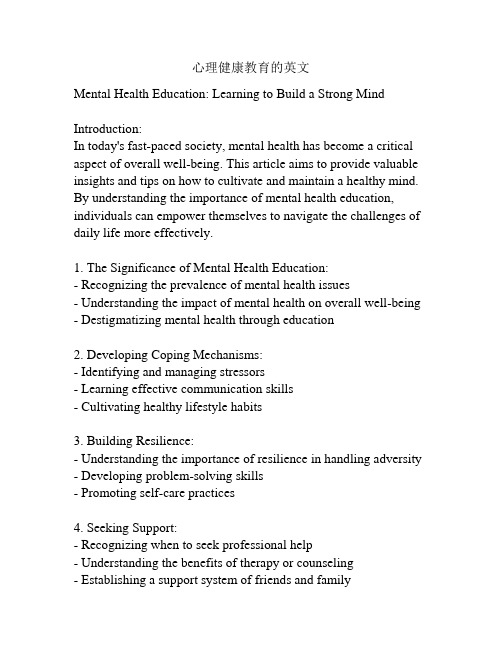
心理健康教育的英文Mental Health Education: Learning to Build a Strong Mind Introduction:In today's fast-paced society, mental health has become a critical aspect of overall well-being. This article aims to provide valuable insights and tips on how to cultivate and maintain a healthy mind. By understanding the importance of mental health education, individuals can empower themselves to navigate the challenges of daily life more effectively.1. The Significance of Mental Health Education:- Recognizing the prevalence of mental health issues- Understanding the impact of mental health on overall well-being - Destigmatizing mental health through education2. Developing Coping Mechanisms:- Identifying and managing stressors- Learning effective communication skills- Cultivating healthy lifestyle habits3. Building Resilience:- Understanding the importance of resilience in handling adversity - Developing problem-solving skills- Promoting self-care practices4. Seeking Support:- Recognizing when to seek professional help- Understanding the benefits of therapy or counseling- Establishing a support system of friends and family5. Promoting Mental Health in Schools and Workplaces:- Incorporating mental health education into curricula- Providing resources and support for employees- Encouraging open conversations about mental health Conclusion:By actively engaging in mental health education, individuals can prioritize their own well-being and that of those around them. Developing coping mechanisms, building resilience, and seeking support are key components in maintaining good mental health. Furthermore, promoting mental health in schools and workplaces fosters a supportive environment, encouraging overall growth and productivity. Remember, taking care of your mental health is essential for a fulfilling and balanced life.。
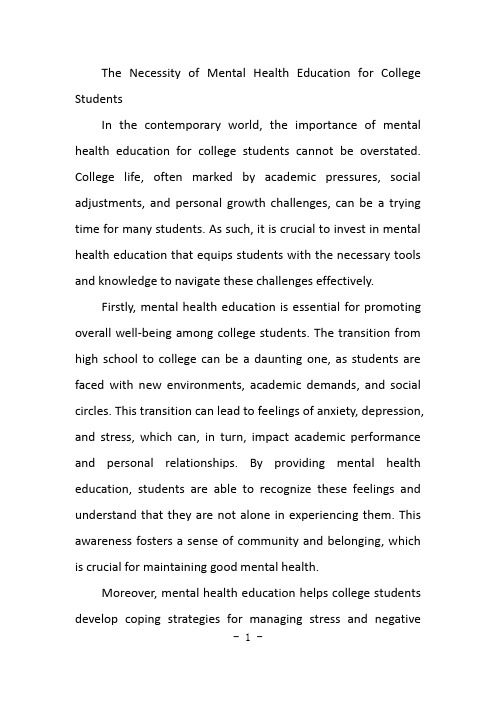
The Necessity of Mental Health Education for College StudentsIn the contemporary world, the importance of mental health education for college students cannot be overstated. College life, often marked by academic pressures, social adjustments, and personal growth challenges, can be a trying time for many students. As such, it is crucial to invest in mental health education that equips students with the necessary tools and knowledge to navigate these challenges effectively.Firstly, mental health education is essential for promoting overall well-being among college students. The transition from high school to college can be a daunting one, as students are faced with new environments, academic demands, and social circles. This transition can lead to feelings of anxiety, depression, and stress, which can, in turn, impact academic performance and personal relationships. By providing mental health education, students are able to recognize these feelings and understand that they are not alone in experiencing them. This awareness fosters a sense of community and belonging, which is crucial for maintaining good mental health.Moreover, mental health education helps college students develop coping strategies for managing stress and negativeemotions. In college, students are often faced with challenges such as exams, assignments, and part-time jobs, which can be overwhelming. Without proper guidance, students may resort to unhealthy coping mechanisms like excessive procrastination, substance abuse, or isolation. Mental health education teaches students healthy ways to cope with stress, such as relaxation techniques, time management, and seeking support from peers or professionals. These skills are invaluable in helping students maintain their mental health and avoid burnout.Additionally, mental health education contributes to the creation of a more inclusive and supportive campus environment. When students are educated about mental health, they are more likely to be understanding and compassionate towards those who may be struggling. This understanding reduces the stigma surrounding mental health issues and encourages a culture of openness and acceptance. As a result, students feel more comfortable seeking help when they need it, leading to earlier intervention and improved outcomes.Furthermore, mental health education prepares college students for the demands of the professional world. In today's fast-paced and competitive job market, employees are expected to handle pressure, manage stress, and maintain apositive attitude. By equipping students with mental health skills in college, they are better prepared to face the challenges of the workplace and excel in their careers.Moreover, the emphasis on mental health education is not just about individual well-being but also about fostering a healthier and more resilient society. College students are the future leaders and influencers of society. By investing in their mental health education, we are investing in the creation of a generation that is more empathetic, understanding, and resilient. This, in turn, will contribute to the overall well-being and progress of society.In conclusion, the necessity of mental health education for college students cannot be understated. It is crucial for promoting overall well-being, developing coping strategies, creating a supportive campus environment, and preparing students for the demands of the professional world. As education systems and society continue to evolve, it is imperative that mental health education becomes a central component of college education, ensuring that students are not only academically prepared but also emotionally resilient for the challenges that lie ahead.。

心理健康教育新闻报道英语作文In recent years, mental health education has gained increasing attention worldwide. With the growing awareness of the importance of mental health, more and more efforts have been made to promote mental health education in schools, workplaces, and communities.First and foremost, mental health education plays a crucial role in raising awareness and reducing stigma surrounding mental health issues. By providing knowledge and understanding about common mental health disorders such as anxiety, depression, and bipolar disorder, individuals are better equipped to recognize the signs and symptoms in themselves and others. This can ultimately lead to earlier intervention and better outcomes for those struggling with mental health challenges.Additionally, mental health education can help individuals develop coping skills and resilience to better manage stress and life challenges. By learning about healthy coping mechanisms, self-care strategies, and the importance of seeking help when needed, individuals can build a strong foundation for their mental well-being.Moreover, mental health education in schools can have a significant impact on the overall well-being of students.By integrating mental health curriculum into the school system, students can learn about emotional regulation, communication skills, and how to support their peers in times of need. This can create a more supportive and inclusive school environment and help reduce the prevalence of mental health issues among young people.Furthermore, mental health education in the workplacecan lead to increased productivity, reduced absenteeism,and improved overall morale. When employees are equippedwith the knowledge and skills to manage their mental health, they are better able to perform their job dutieseffectively and contribute to a positive work environment.In conclusion, mental health education is an essential component of overall well-being and should be prioritizedin all aspects of society. By raising awareness, reducing stigma, and providing individuals with the tools they needto support their mental health, we can create a healthier and more supportive world for everyone.近年来,心理健康教育在全球范围内越来越受到重视。
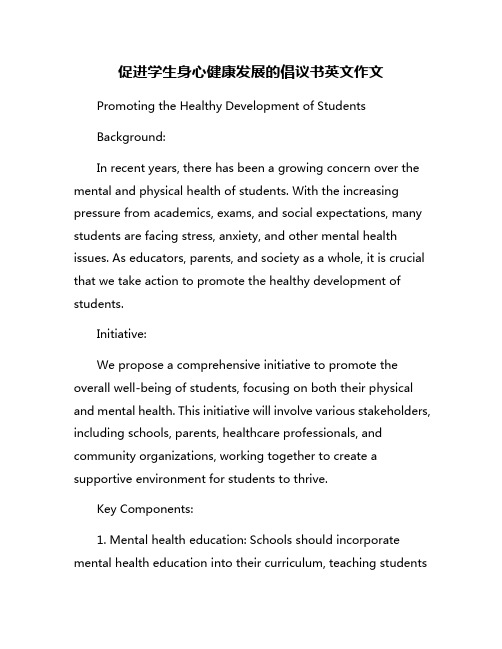
促进学生身心健康发展的倡议书英文作文Promoting the Healthy Development of StudentsBackground:In recent years, there has been a growing concern over the mental and physical health of students. With the increasing pressure from academics, exams, and social expectations, many students are facing stress, anxiety, and other mental health issues. As educators, parents, and society as a whole, it is crucial that we take action to promote the healthy development of students.Initiative:We propose a comprehensive initiative to promote the overall well-being of students, focusing on both their physical and mental health. This initiative will involve various stakeholders, including schools, parents, healthcare professionals, and community organizations, working together to create a supportive environment for students to thrive.Key Components:1. Mental health education: Schools should incorporate mental health education into their curriculum, teaching studentsabout stress management, emotional regulation, and seeking help when needed. This will help students develop coping skills and resilience to deal with the challenges they may face.2. Counseling services: Schools should provide access to counseling services for students who need support. Trained counselors can provide individual or group therapy, crisis intervention, and referrals to mental health professionals if necessary.3. Physical activity: Encouraging physical activity is essential for promoting students' physical health and reducing stress. Schools should offer a variety of physical education classes, sports teams, and extracurricular activities to keep students active.4. Healthy eating habits: Schools should promote healthy eating habits by offering nutritious meals in the cafeteria, teaching nutrition education in classes, and encouraging students to make healthy food choices.5. Parental involvement: Parents play a crucial role in supporting their children's well-being. Schools should engage parents through workshops, seminars, and parent-teacher meetings to provide information on how to support their children's mental and physical health.6. Community support: Community organizations can also play a role in promoting the healthy development of students. They can offer resources such as mental health clinics, support groups, and recreational activities for students to engage in.Benefits:By implementing this initiative, we can create a healthy and supportive environment for students to thrive. Students will be better equipped to handle stress, improve their academic performance, and develop lifelong habits that promote their overall well-being.Conclusion:Promoting the healthy development of students is a collective effort that requires the collaboration of schools, parents, healthcare professionals, and community organizations. By taking proactive steps to address students' mental and physical health needs, we can create a brighter future for our youth. Let us work together to ensure that every student has the opportunity to reach their full potential.。

大学生心理健康教育的必要性的英语作文(中英文版)The necessity of mental health education for college students is an issue that cannot be overlooked in today"s fast-paced and pressure-filled academic environment.It is imperative to address this aspect of education to ensure the holistic development of young adults.在当今快速变化且压力重重的学术环境中,大学生心理健康教育的必要性是一个不容忽视的问题。
确保青少年全面发展的当务之急是关注这一教育方面。
College years are a period of significant transition, where students encounter various challenges, such as adjusting to a new environment, managing academic stress, and navigating interpersonal relationships.Mental health education equips them with the necessary skills to cope with these pressures effectively.大学时期是一个重要的转型期,学生们在此期间会遇到各种挑战,比如适应新环境、应对学业压力以及处理人际关系。
心理健康教育为他们提供了有效应对这些压力所需的技能。
Moreover, the competitive nature of higher education can lead to increased anxiety and stress among students, which may adversely affect their mental well-being.By incorporating mental health education into the curriculum, educational institutions can foster a supportive and understanding environment that promotes resilience and mental toughness.此外,高等教育的竞争性质可能导致学生焦虑和压力增加,这可能会对他们的心理健康产生不利影响。
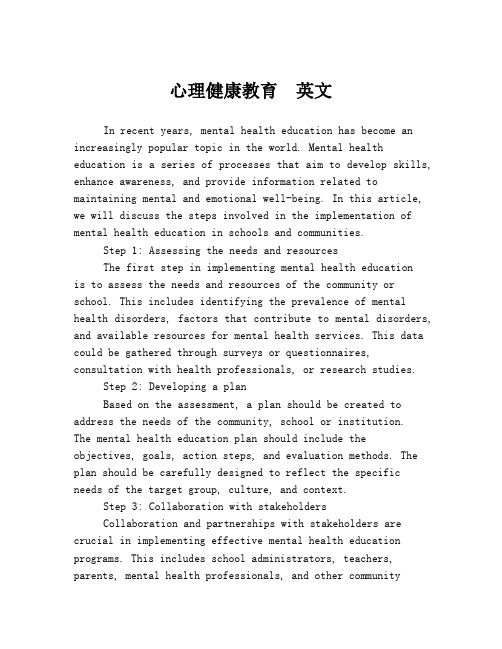
心理健康教育英文In recent years, mental health education has become an increasingly popular topic in the world. Mental health education is a series of processes that aim to develop skills, enhance awareness, and provide information related to maintaining mental and emotional well-being. In this article, we will discuss the steps involved in the implementation of mental health education in schools and communities.Step 1: Assessing the needs and resourcesThe first step in implementing mental health educationis to assess the needs and resources of the community or school. This includes identifying the prevalence of mental health disorders, factors that contribute to mental disorders, and available resources for mental health services. This data could be gathered through surveys or questionnaires, consultation with health professionals, or research studies.Step 2: Developing a planBased on the assessment, a plan should be created to address the needs of the community, school or institution.The mental health education plan should include the objectives, goals, action steps, and evaluation methods. The plan should be carefully designed to reflect the specific needs of the target group, culture, and context.Step 3: Collaboration with stakeholdersCollaboration and partnerships with stakeholders are crucial in implementing effective mental health education programs. This includes school administrators, teachers, parents, mental health professionals, and other communityleaders. Engaging stakeholders in the development and implementation of the plan enhance the credibility and the commitment to the program.Step 4: Implementing the programThe program should be implemented systematically in a phased approach, with clear guidelines and appropriate resources. This could include the use of evidence-based materials, training of teachers, and establishing referral systems. The program should be accessible and inclusive of all students or members of the community regardless of their social, cognitive, and physical abilities.Step 5: Continuous evaluationThe evaluation of the program is an ongoing process. This includes regularly monitoring and assessing the impact of the program, making necessary adjustments, and improving the quality of the program. The evaluation should provide feedback on the elements of the program such as awareness, understanding, and prevention of mental health problems.In conclusion, mental health education provides individuals with the knowledge and skills needed to maintain mental and emotional well-being. The implementation of the program requires a structured approach that involves collaboration, careful planning, and continuous evaluation. By investing in mental health education, we can promote a healthy, productive, and well-balanced society.。
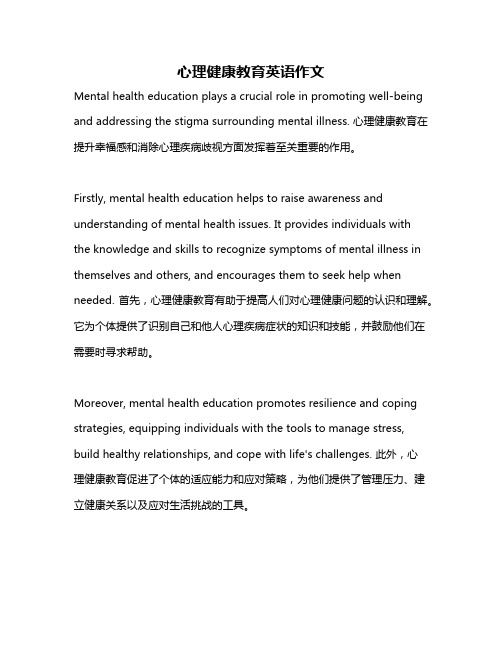
心理健康教育英语作文Mental health education plays a crucial role in promoting well-being and addressing the stigma surrounding mental illness. 心理健康教育在提升幸福感和消除心理疾病歧视方面发挥着至关重要的作用。
Firstly, mental health education helps to raise awareness and understanding of mental health issues. It provides individuals withthe knowledge and skills to recognize symptoms of mental illness in themselves and others, and encourages them to seek help when needed. 首先,心理健康教育有助于提高人们对心理健康问题的认识和理解。
它为个体提供了识别自己和他人心理疾病症状的知识和技能,并鼓励他们在需要时寻求帮助。
Moreover, mental health education promotes resilience and coping strategies, equipping individuals with the tools to manage stress, build healthy relationships, and cope with life's challenges. 此外,心理健康教育促进了个体的适应能力和应对策略,为他们提供了管理压力、建立健康关系以及应对生活挑战的工具。
Furthermore, mental health education fosters a supportive and inclusive community. By promoting open discussions and reducing stigma, it creates an environment where individuals feel comfortable seeking help and supporting one another. 此外,心理健康教育培育了一个支持性和包容性的社区。

全面推进中小学生心理健康教育工作英文版Comprehensive Promotion of Mental Health Education for Primary and Secondary School StudentsIn recent years, there has been a growing recognition of the importance of mental health education for primary and secondary school students. It is crucial to provide students with the necessary tools and knowledge to navigate the complexities of their emotions and mental well-being.One key aspect of promoting mental health education is to integrate it into the school curriculum. By incorporating lessons on mental health and well-being into various subjects, students can learn about emotional regulation, stress management, and the importance of seeking help when needed. This integration helps to normalize discussions around mental health and reduces the stigma associated with seeking support.In addition to curriculum integration, schools can also organize workshops, seminars, and awareness campaigns to further promote mental health education. These activities can provide students with practical skills and strategies to cope with stress, anxiety, and other mental health challenges. By creating a supportive and open environment, schools can encourage students to prioritize their mental well-being and seek help when necessary.Furthermore, schools can collaborate with mental health professionals and organizations to provide additional support and resources to students. By partnering with experts in the field, schools can ensure that students have access to accurate information and guidance on mental health issues. This collaboration can also help to identify students who may be struggling with their mental health and connect them with appropriate services and interventions.In conclusion, the comprehensive promotion of mental health education for primary and secondary school students is essential for fostering a supportive and healthy learning environment. By integrating mental health into the curriculum, organizing workshops and awarenesscampaigns, and collaborating with mental health professionals, schools can empower students to prioritize their mental well-being and seek help when needed.。

心里健康的英语教育Mental Health Education for a Healthy MindIntroduction:Promoting mental health is essential for maintaining a healthy mind and overall well-being. In this article, we will discuss the importance of mental health education and various ways to nurture a positive mindset.Understanding Mental Health:Mental health refers to a person's emotional, psychological, and social well-being. It affects how individuals think, feel, and act. Just as physical health is crucial, taking care of one's mental health is equally important.The Need for Mental Health Education:1. Reducing Stigma: Education helps eliminate the stigma associated with mental health issues. It encourages open discussions and acceptance, creating a supportive environment.2. Early Intervention: By educating individuals about common mental health disorders and their symptoms, we can identify issues early on and seek appropriate help.3. Promoting Self-care: Education equips individuals with knowledge and skills to practice self-care and maintain good mental health.4. Enhancing Resilience: Nurturing mental health through education helps individuals develop resilience, enabling them to cope better with various challenges.Strategies for Mental Health Education:1. Awareness Campaigns: Conducting awareness campaigns through social media, schools, and workplaces can help reach a wider audience.2. Workshops and Seminars: Organizing interactive sessions to discuss mental health issues and coping strategies can help spread knowledge and foster dialogue.3. Mental Health in Curriculum: Integrating mental health topics into the curriculum can facilitate understanding and promote regular discussions among students.4. Training for Educators: Providing training and resources to teachers and educators enable them to address mental health concerns effectively and support students.Promoting a Healthy Mindset:1. Stress Management: Educating individuals about stress management techniques such as meditation, exercise, and time management promotes a healthy mindset.2. Healthy Relationships: Teaching individuals about healthy communication, empathy, and boundaries helps foster positive relationships.3. Mindfulness and Self-reflection: Encouraging mindfulness practices and self-reflection enables individuals to be more aware of their thoughts and emotions, leading to a healthier mindset.4. Seeking Help: Educating individuals about the importance of seeking professional help when needed ensures that they are well-supported in their mental health journey.Conclusion:Incorporating mental health education into our lives is essential for cultivating a healthy mindset. By reducing stigma, promoting self-care, and enhancing resilience, we can create an environment that supports and nurtures mental well-being. Let us prioritize mental health education to ensure a healthier and happier society.。

大学生心理教育的必要性英语作文The Importance of Mental Health Education for College StudentsIn recent years, there has been a growing awareness of the importance of mental health education for college students. The transition from high school to college can be a very challenging time for many young adults, and it is important that they have the resources and support they need to navigate this transition successfully.One of the main reasons why mental health education is so important for college students is because of the high levels of stress and pressure that they face. College students are often juggling a heavy academic workload, extracurricular activities, part-time jobs, and social activities, all while trying to figure out who they are and what they want to do with their lives. This can be a recipe for mental health issues such as anxiety, depression, and substance abuse.By providing college students with the necessary education and resources to support their mental health, we can help them build the skills they need to cope with these challenges in a healthy and productive way. This includes teaching them aboutthe importance of self-care, stress management, and seeking help when needed. It also involves reducing the stigma surrounding mental health issues and promoting a culture of openness and support on campus.Furthermore, mental health education can also help college students to develop the emotional intelligence and resilience they need to succeed in both their academic and personal lives. By learning how to manage their emotions, communicate effectively, and build positive relationships, they can improve their overall well-being and increase their chances of academic success.In addition, mental health education can help to prevent more serious issues from developing later in life. Research has shown that mental health problems that go untreated during college can have long-term consequences, leading to higher rates of substance abuse, relationship problems, and even suicide. By addressing these issues early on, we can help college students to build a strong foundation for their future mental health and well-being.Overall, mental health education is a crucial component of a college student's overall education and development. By providing them with the tools and resources they need tosupport their mental health, we can help them to thrive both in college and beyond. It is essential that colleges and universities continue to prioritize mental health education and support for their students, in order to create a campus environment that is healthy, supportive, and conducive to learning and growth.。
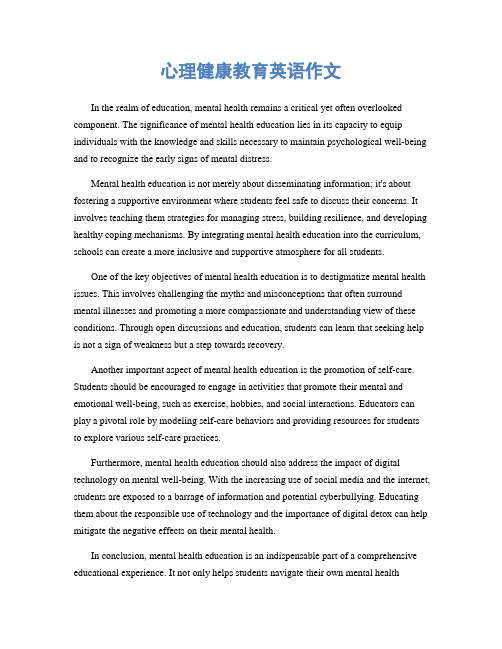
心理健康教育英语作文In the realm of education, mental health remains a critical yet often overlooked component. The significance of mental health education lies in its capacity to equip individuals with the knowledge and skills necessary to maintain psychological well-being and to recognize the early signs of mental distress.Mental health education is not merely about disseminating information; it's about fostering a supportive environment where students feel safe to discuss their concerns. It involves teaching them strategies for managing stress, building resilience, and developing healthy coping mechanisms. By integrating mental health education into the curriculum, schools can create a more inclusive and supportive atmosphere for all students.One of the key objectives of mental health education is to destigmatize mental health issues. This involves challenging the myths and misconceptions that often surround mental illnesses and promoting a more compassionate and understanding view of these conditions. Through open discussions and education, students can learn that seeking help is not a sign of weakness but a step towards recovery.Another important aspect of mental health education is the promotion of self-care. Students should be encouraged to engage in activities that promote their mental and emotional well-being, such as exercise, hobbies, and social interactions. Educators can play a pivotal role by modeling self-care behaviors and providing resources for students to explore various self-care practices.Furthermore, mental health education should also address the impact of digital technology on mental well-being. With the increasing use of social media and the internet, students are exposed to a barrage of information and potential cyberbullying. Educating them about the responsible use of technology and the importance of digital detox can help mitigate the negative effects on their mental health.In conclusion, mental health education is an indispensable part of a comprehensive educational experience. It not only helps students navigate their own mental healthchallenges but also fosters empathy and support for others facing similar issues. By prioritizing mental health education, we can empower the next generation with the tools they need to lead mentally healthy lives and contribute positively to society. 。

心理健康教育计划英语In today's fast-paced and often stressful world, the importance of mental health education cannot be overstated.A comprehensive mental health education plan that incorporates both traditional and innovative methods is crucial for fostering a healthy, resilient, and supportive learning environment. This plan aims to equip students with the necessary skills and knowledge to manage their emotions, reduce stress, and promote overall well-being.**1. Curriculum Integration**Incorporating mental health education into the regular school curriculum is essential. By integrating relevant topics and concepts into subjects like science, social studies, and language arts, students can gain a deeper understanding of mental health issues and their impact on daily life. Teachers can also utilize interactiveactivities and role-playing to engage students and foster a deeper understanding of these issues.**2.Counseling Services**Providing access to professional counseling services is crucial for addressing specific mental health concerns. Schools should offer regular counseling sessions led by qualified professionals who can provide support, guidance, and referrals as needed. These sessions can cover a rangeof topics, from stress management to anxiety and depression. **3.Peer Support Groups**Peer support groups can provide a safe and supportive space for students to share their experiences and struggles with mental health issues. These groups can be facilitated by trained teachers or student leaders and can cover arange of topics, from stress management to building resilience. Peer support groups can also help to normalize mental health discussions and reduce stigma.**4.Mindfulness and Meditation**Mindfulness and meditation are effective tools for managing stress, reducing anxiety, and promoting overallwell-being. Schools can introduce these practices into the daily routine, such as through short mindfulness exercises before class or during breaks. These practices can helpstudents to stay calm and focused, reducing the negative impact of stress on their mental health.**5.Family Engagement**Families play a crucial role in mental health education. Schools should work closely with families to provide information and resources on mental health, encourage open communication between parents and children, and involve families in school-based mental health activities and events.**6.Technology-Based Resources**Leveraging technology can help to expand the reach and impact of mental health education. Schools can utilizeonline resources, apps, and digital platforms to provide additional support and information to students and families. These resources can include interactive tools for stress management, anxiety reduction, and resilience building.**7.Ongoing Assessment and Evaluation**Ongoing assessment and evaluation are essential for ensuring the effectiveness of the mental health education plan. Schools should regularly collect feedback fromstudents, teachers, and families to identify areas of improvement and areas where the plan is working well. Evaluation data can be used to adjust the plan as needed and ensure that it continues to meet the needs of the student population.In conclusion, a comprehensive mental health education plan that incorporates curriculum integration, counseling services, peer support groups, mindfulness and meditation, family engagement, technology-based resources, and ongoing assessment and evaluation is crucial for promoting mental well-being in schools. By fostering a supportive and inclusive learning environment, schools can help students to develop the skills and knowledge they need to manage their emotions, reduce stress, and thrive both academically and personally.**融合心理健康教育计划**在当今快节奏且充满压力的世界中,心理健康教育的重要性不言而喻。
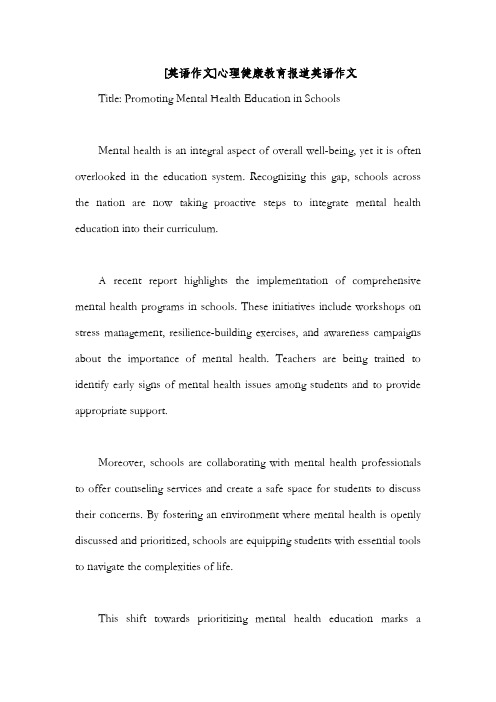
[英语作文]心理健康教育报道英语作文Title: Promoting Mental Health Education in SchoolsMental health is an integral aspect of overall well-being, yet it is often overlooked in the education system. Recognizing this gap, schools across the nation are now taking proactive steps to integrate mental health education into their curriculum.A recent report highlights the implementation of comprehensive mental health programs in schools. These initiatives include workshops on stress management, resilience-building exercises, and awareness campaigns about the importance of mental health. Teachers are being trained to identify early signs of mental health issues among students and to provide appropriate support.Moreover, schools are collaborating with mental health professionals to offer counseling services and create a safe space for students to discuss their concerns. By fostering an environment where mental health is openly discussed and prioritized, schools are equipping students with essential tools to navigate the complexities of life.This shift towards prioritizing mental health education marks asignificant step in nurturing the emotional and psychological development of young individuals. As schools continue to embrace these programs, they are paving the way for a healthier, more resilient generation.。

心理健康教育英文《The Importance of Mental Health Education》Mental health education is an essential aspect of overall well-being that is often overlooked. In today's fast-paced and demanding world, many people are struggling with mental health issues, whether it be stress, anxiety, depression, or other conditions. Therefore, it is crucial to prioritize mental health education and raise awareness about the importance of caring for one's mental well-being.First and foremost, mental health education helps individuals recognize and understand their own mental health needs. By learning about the signs and symptoms of various mental health conditions, people can better identify when they may need help and seek appropriate support. Additionally, mental health education also provides individuals with the knowledge and skills to cope with stress, manage their emotions, and improve their overall mental well-being.Furthermore, mental health education helps reduce the stigma surrounding mental illness. By increasing awareness and understanding, people are more likely to approach mental health issues with empathy and compassion, rather than judgment and discrimination. It also encourages individuals to seek help when needed, without feeling ashamed or embarrassed.In addition, mental health education is crucial for promoting a positive and supportive environment in schools, workplaces, and communities. By incorporating mental health education into thecurriculum or workplace programs, individuals can learn to support each other's mental well-being and create a more inclusive and understanding environment.Overall, mental health education is an essential component of maintaining a healthy society. It helps individuals recognize and understand their mental health needs, reduces stigma, and promotes a positive and supportive environment. Therefore, it is important to prioritize mental health education and ensure that everyone has access to the knowledge and resources needed to care for their mental well-being.。
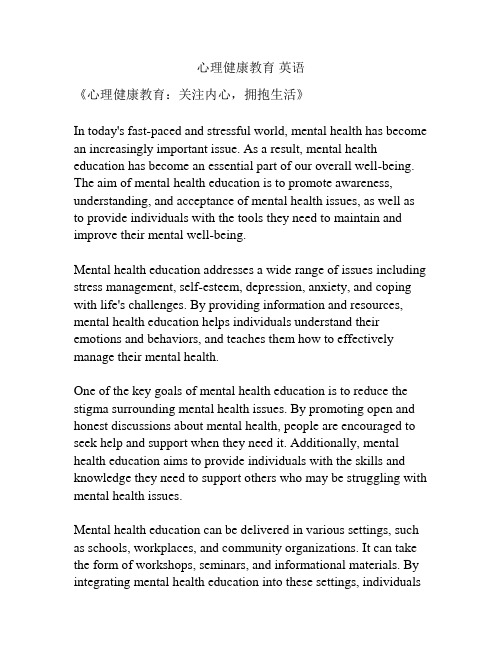
心理健康教育英语《心理健康教育:关注内心,拥抱生活》In today's fast-paced and stressful world, mental health has become an increasingly important issue. As a result, mental health education has become an essential part of our overall well-being. The aim of mental health education is to promote awareness, understanding, and acceptance of mental health issues, as well as to provide individuals with the tools they need to maintain and improve their mental well-being.Mental health education addresses a wide range of issues including stress management, self-esteem, depression, anxiety, and coping with life's challenges. By providing information and resources, mental health education helps individuals understand their emotions and behaviors, and teaches them how to effectively manage their mental health.One of the key goals of mental health education is to reduce the stigma surrounding mental health issues. By promoting open and honest discussions about mental health, people are encouraged to seek help and support when they need it. Additionally, mental health education aims to provide individuals with the skills and knowledge they need to support others who may be struggling with mental health issues.Mental health education can be delivered in various settings, such as schools, workplaces, and community organizations. It can take the form of workshops, seminars, and informational materials. By integrating mental health education into these settings, individualsare given the opportunity to learn about mental health in a supportive and understanding environment.Overall, mental health education plays a crucial role in promoting mental well-being and addressing the challenges that individuals may face. By providing individuals with the knowledge and resources they need to take care of their mental health, mental health education helps create a society that is more mindful, empathetic, and supportive of mental health issues. Through education and understanding, individuals can learn to embrace their inner struggles and lead fulfilling lives.。